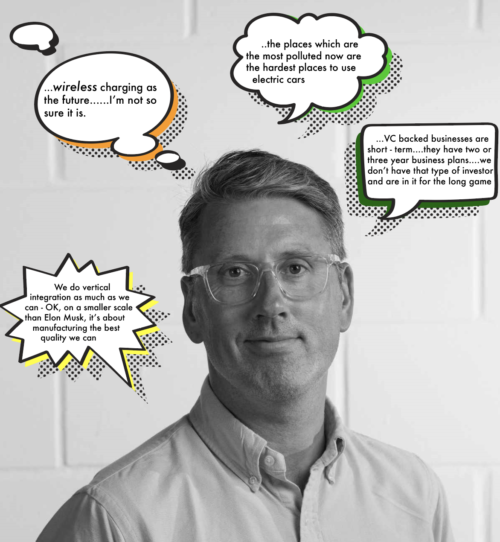News & Blog
E&T magazine interview with Simpson & Partners EV Charging

E&T magazine interview with Simpson & Partners EV charging
Renowned E&T editor and esteemed journalist Dickon Ross came to the factory to interview David and Mandy about the future of all things EV charging. David talks Elon, venture capitalist businesses and sodium batteries. Dickon has a passion for all things IT. We’re proud to tease him away from his desktop and into the Cotswolds (apparently it’s quite a rare occurrence). We also discover that he also collects vinyl 1960’s radio recordings (but that’s off the record!).

How will we charge our electric vehicles? At home or at work? At the filling station or at the supermarket? DC or AC? And what colour would you like? We ask two experts on chargers.
Mandy and David Simpson are co-directors of family-run Simpson & Partners, which makes designer EV chargers in the Cotswolds. He is a former bank IT professional who heads the engineering side while she, as a former fashion designer previously working at DKNY in New York, takes care of the design, look and feel. I met up with them at their factory in the Cotswolds.
E&T: How did you get started with this venture?
Mandy Simpson: We started Andersen in 2016, making electric car chargers, based in London. It was David’s idea on his way into work. He worked at Lloyds IT. And I was having a career in fashion at the time. And he said, oh, let’s get into the EV business, because it’s booming. So we started Andersen from scratch, he led our design team technical team and I did all the brand. And we did two rounds of Crowdcube. Then these venture capitalists came along and that’s where we saw a discord in what our plans were, what our vision was and what they wanted to do, and we decided to part ways.
Escape to the country
So in the middle of lockdown in 2020, we relocated to the Cotswolds. We wanted to build our own business again. We had some unfinished business to do. We wanted to build our home here and bring up our kids here, and the week after, we launched our Simpson & Partners brand, as such. We knew we wanted to be a manufacturer. We found this location as a factory space and a manufacturing space, and we knew we could make a difference compared to other competitors.
David has a real passion for electronics and making things and manufacturing things that last, that don’t end up in the landfill. We put a stake in the ground to build our factory in Wiltshire, with the idea that we would build affordable and quality products in this sector. He leads this team of engineers. We build our own bespoke electronics and have our own set of 3D printers.
David Simpson: We try and do as much vertical integration as we can – OK, on a smaller scale than Elon Musk, but it’s about manufacturing the best quality that we can. We’re at a very exciting time now for us and other people in the industry where 3D-printing technologies, which I always thought until a few years ago were airy-fairy hobbyist type of kit, now are allowing you to do things that we couldn’t even do two years ago.
The difference
The difference from our previous business was that we were VC-backed before and I think UK industry suffered from VC backing and private equity, because everyone’s got a very short business plan of like 36 months. So if you look at the car industry, why it failed up to the 1970s, maybe unions et cetera too, but if you look at people like the Germans, they had 10-year business plans. And they looked at long-term investments, not short outcomes. My previous business was VC-based and everything was very short-sighted and focussed on the exit. They don’t want to invest in factories, people, equipment, because it doesn’t really reflect in the resale value.
We have the luxury this time of not having that type of investor and we are in for the long game. VC kind of businesses are very short-term, all about two- or three-year plans. Whereas when you make things and have a manufacturing base that’s anchored somewhere, a physical space and try to bring as many processes in-house to be vertical, it pays off to have a five-, 10- or 15-year vision.
E&T: What does sustainability in this business mean to you?
David Simpson: Making sure that product we make now is still on the wall in 10 years’ time. It can be repaired, it can be upgraded to just make it right. I don’t want stuff that’s made as cheaply as possible that you throw out in three years’ time. The enclosure should last 20 years. Electronics-wise, there’s the WEEE regulations and we look at how we recycle that.
The challenges
The challenges become bigger when we start doing batteries etc. They have more challenges like what you do with end-of-life batteries. For our charge-point, we will support for the next 5 years all the components and the parts in those boxes, So people have a long-term purchase that should last, and the way we manufacture it is hopefully better than our competitors. We have a direct sales model. We don’t give 20 per cent to a distributor. People buy direct from us.
continue reading the full article here…
- © 2024 Simpson – Partners Ltd. All Rights Reserved.